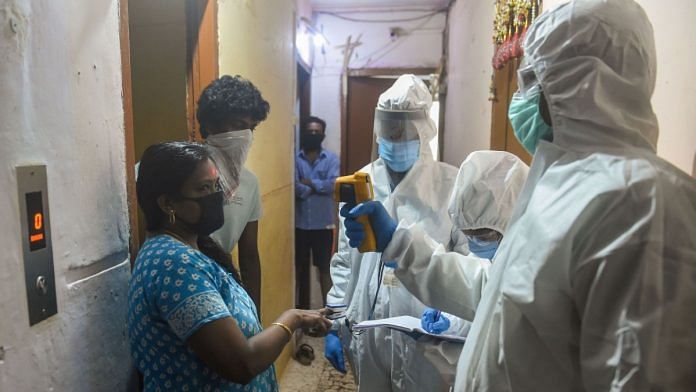Mumbai: Maharashtra capital Mumbai, one of the cities worst affected by Covid-19, Wednesday marked several milestones in its battle against the pandemic.
The Brihanmumbai Municipal Corporation (BMC), the city’s civic agency, said in a press note that Mumbai has recorded its highest-ever single-day test count, and breached the five-lakh mark in the total number of tests conducted so far.
It added that the average growth rate of Covid-19 has slid below one per cent in Mumbai, and the doubling rate — the number of days it takes for the infections to double — widened to 73 days.
“The first Covid test was conducted in Mumbai on 3 February. We reached the one-lakh mark in total number of tests only on 6 May, but after that it took just 25 days to reach the two-lakh mark, 23 days to reach the three-lakh mark, 20 days to reach the four-lakh mark and now, we covered the next lap in just 15 days to touch the five-lakh mark Wednesday,” an official from the BMC said.
The official added that while the number of daily tests is increasing, the positivity rate — the number of positive diagnoses as a share of the samples tested — has dipped.
“In addition, due to better health facilities and treatment, the recovery rate has also improved,” the official said. “All this is indicative of the city starting to get the crisis under control,” he added.
According to the health bulletin issued Wednesday evening, Mumbai has recorded 1,11,964 Covid-19 cases so far, with 20,123 cases active as of now.
The city conducted 11,643 tests Wednesday. Since 7 July, the BMC has opened testing for all, scrapping the need for a doctor’s prescription.
The milestones come a day after a BMC sero-surveillance survey, carried out in partnership with the Niti Aayog and the Tata Institute of Fundamental Research, showed encouraging results.
Coronavirus serological surveys seek to identify a population’s exposure to Covid-19 by testing people for antibodies, including the asymptomatic patients who may have recovered without requiring treatment.
The Mumbai survey, which focused on the three wards of Dahisar (R North), Chembur (M West) and Matunga (F North), showed
that 57 per cent of the samples from slums and 16 per cent from non-slum areas had Covid antibodies.
Since 42 per cent of the Mumbai residents live in slums, the results mean a large number of the people have already been infected by the virus and may have developed immunity against it.
Also Read: Dharavi’s unexpected Covid success story has lessons for Delhi, other crowded cities
Growth rate below 1% in 18 of 24 administrative wards
The average daily growth of Covid cases across Mumbai has dipped to 0.97 per cent, below one per cent for the first time, according to the BMC. Moreover, 18 of Mumbai’s 24 administrative wards have reported daily growth of cases at a rate of either one per cent or lower.
The main problem areas, where the daily growth rate is still over one per cent, remain restricted to a few of the city’s northern suburbs, such as Goregaon, Kandivali, Mulund and surrounding areas, as well as the city’s southernmost localities, such as the elite Malabar Hill and Colaba.
Mumbai’s doubling rate, meanwhile, has grown to 73 days, which represents a big leap from 14 days on 31 May. Two of Mumbai’s 24 administrative wards, covering the Santacruz, Khar and Kurla areas, have doubling rates of more than 100 days, while only three have a doubling rate of below 50 days.
Also Read: 57% of Mumbai slum dwellers were exposed to Covid, developed antibodies, finds sero survey



